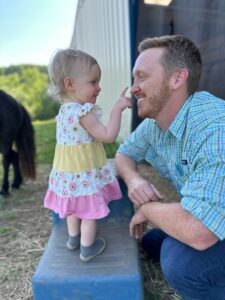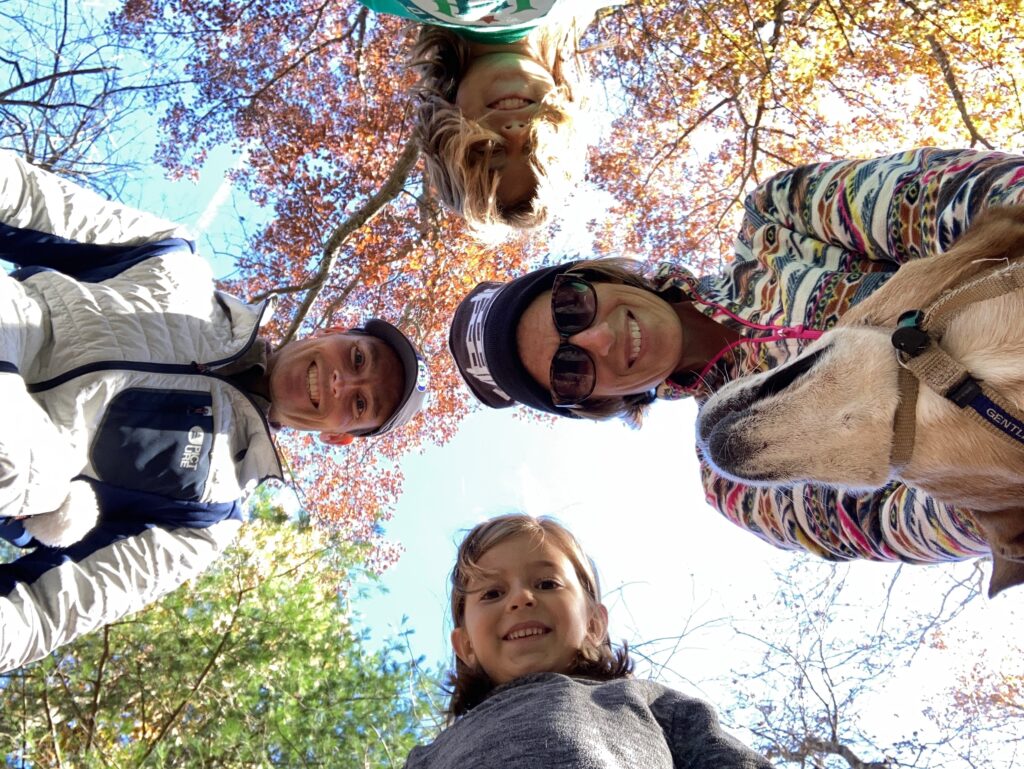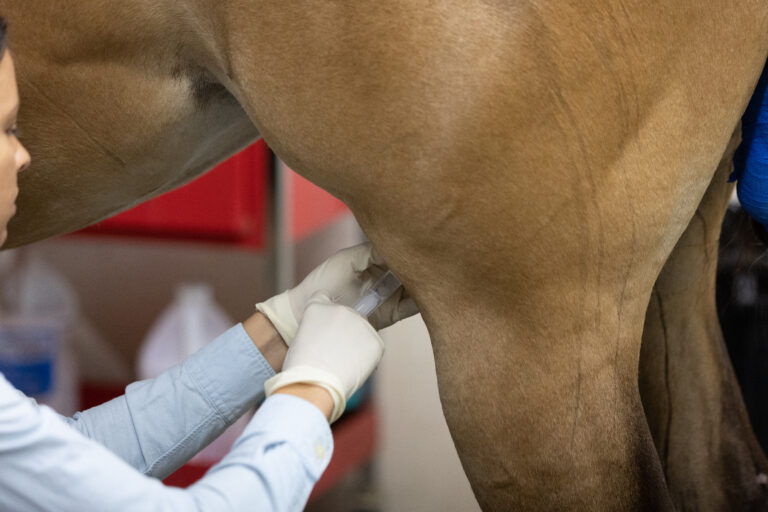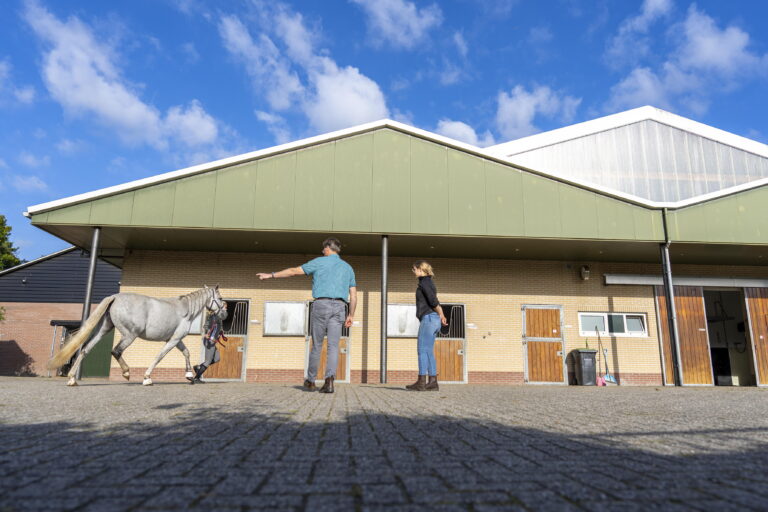This article originally appeared in the Winter 2024 issue of EquiManagement. Sign up here for a FREE subscription to EquiManagement’s quarterly digital or print magazine and any special issues.

For equine veterinarians, with their long work hours and after-hour emergency responsibilities, caring for children can be challenging. One concern older practice owners expressed when discussing the marked gender shift in equine practice over the last decade is that new mothers sometimes do not return to work at the end of their maternity leaves. Some early-career female horse doctors find the demands of parenting an infant or toddler to be incompatible with their work life, and they regretfully accept a position in companion animal practice.
In a recent discussion about maternity leave and parenting on the Facebook group “Women in Equine Practice,” all but two of the 99 veterinarians commenting are still in equine practice. They relayed a broad range of experiences, with veterinarians who gave birth in decades past reporting significantly less positive ones.
Carlin Jones, DVM, whose daughter was born in 2007, is one of those equine practitioners who weighed in, saying she hoped her story is not the norm: “It was 2004, in Pennsylvania. I worked up until the day my daughter was born and was on call till 8 a.m. that morning,” she explained. “I developed severe pre-eclampsia and had an emergency C-section two weeks before my due date. I called my boss as I was leaving my doctor’s office and heading to the hospital, and he was angry with me for leaving two weeks early. My daughter was born with an APGAR of 2 and was transferred to Children’s Hospital of Philadelphia (CHOP). She spent two weeks in their NICU, diagnosed with (hypoxic-ischemic encephalopathy). Yup, I had a dummy foal. I went into acute renal failure and was hospitalized for six days.
“The day she came home, I got a call from my boss. He said if I wasn’t back to work in a week, I would be fired,” Jones continued. “I had just bought a house, so I went back to work three weeks after an emergency C-section and acute renal failure, with a baby with a seizure disorder in the truck with me because she was too young for day care. I had a terrible boss but an amazing associate colleague and the best clients. I worked in equine for 17 more years. I had my daughter in the car all the time at all hours. I have so many regrets. But I also have some amazing memories and had some great times with her. It’s a double-edged sword for sure, but I regret putting my career ahead of my daughter.”
Boarded surgeon Amy Armentrout, DVM, MS, DACVS, who graduated from veterinary school in 2006, said both her children were delivered via C-section. She took 5.5 weeks off with the first child, and 6.5 with the second.
“It was not enough time, especially with abdominal surgery and a newborn,” Armentrout said, “But 1. There was no paid maternity leave, 2. I was the only surgeon in the practice, and 3. As the main producer for the practice and colleagues burning out from covering call … I felt many pressures to return.
“I wished I had more time with my babies,” she lamented. “With my first, I covered a weekend on call, supervising the intern 10 days after my C-section. I don’t look back at that time with any ill feelings. I think moms do what they feel like they have to do. I’m still in equine and my kids love to go to work with me. They’re kind, empathetic, curious, patient, hard-working, flexible, service-oriented … skills they learned as sons of an equine practitioner. It’s a job I love passionately and can’t imagine doing anything else. It’s definitely more tricky as a single mom, but nothing teaches you boundaries better than motherhood.”
In contrast, Katie Coleman, DVM, had her first child in April 2024. She shared, “I have felt very supported through the process and really appreciate the flexibility and support of my coworkers and boss,” she said.
Corey Paradine, DVM, who gave birth almost four years ago, wrote, “I took eight weeks, which was plenty for me. I was happy to go back, but I went back ‘part-time’ and have kept that schedule ever since. I think it would be hard for me to stay in equine medicine if I hadn’t been able to adjust my schedule.”
Christy Coulson Cullen, DVM, summed up the experience by relating, “It was hard. Really hard. Continues to be hard as a full-time equine vet and a full-time mom. This is the issue we need to talk about. We will continue to lose equine vets if we can’t support mothers.”
Time Management and Scheduling

Our culture still generally assigns people gender-based roles, with research showing women are usually the primary caregivers to family members, including children and elders, and responsible for social planning and household management, including food shopping, meal preparation, laundry, and cleaning. Men are typically responsible for outside chores such as home repair, yard maintenance, and car care. In a study of physicians, “Among married or partnered respondents with children, after adjustment for work hours, spousal employment, and other factors, women spent 8.5 more hours per week on domestic activities. In the subgroup with spouses or domestic partners who were employed full-time, women were more likely to take time off during disruptions of usual child care arrangements than men (42.6% vs. 12.4%). Most men’s spouses or domestic partners were not employed full-time, which contrasted sharply with the experiences of women.” i With most families made up of two working parents, it can be difficult to get everything done.
Justin Jornigan, DVM, owner of Foothills Large Animal Hospital, a three-doctor practice in Nebo, North Carolina, has a 15-month-old daughter and is expecting a baby boy in November. He and his wife, the practice manager, share care of their daughter.
“The hardest thing about being a parent and an equine vet is trying not to feel guilty while battling the work schedule for that sacred, quality time with my child and wife,” he said, acknowledging that life has changed since he became a parent. “On a typical workday, I get three to four hours with her—maybe a quick good-morning glance at breakfast and a couple of hours in the evening before her 8 p.m. bedtime. I do everything in my power to be efficient at work and get home on time to savor my time with my young daughter and her superhero mom. It has become easier to say ‘no’ at work.”
Caitlin Rothacker, DVM, sitting on the edge of the soccer field with a to-go beverage enjoying the glorious sunshine, said she and her husband have two kids: Phoebe is almost 8, and Charlie is 11.5. “We contemplated a third but affectionately call my career our third child,” she said. Rothacker is a partner at Grand Prix Equine in Newtown, Connecticut. She said the hardest things about being a parent as an equine veterinarian have evolved as the kids age. “The hardest part for us has always been reliable childcare,” she noted. “My husband has always had to work nontraditional hours as well, and during the early years, we really struggled financially to pay for childcare. Charlie was born in my first year as a Field Service resident, and there were plenty of days that my husband would drop him by at 5 p.m. to head off to work, and some random fourth year student, administrative assistant, or resident-mate would be rocking his car seat when I showed back up sometime later. As they have gotten older, this has become easier, and our finances have evolved some too. Right now, the hardest part is disappointing them when I am not available.”
Explaining how parenting changed her life, Rothacker said, “I think many of us are incredibly driven perfectionists, and having children meant I have had to soften my drive to perfection. I cannot craft homemade Halloween costumes and meet the demands of my clients all in the same day. So there are days my parenting is far from stellar and some days I feel like I am letting my clients down by being unavailable to squeeze in that last set of ’emergency’ hock injections.”
More Supportive Practices and Clients
Practices are increasingly embracing the reality that veterinarians will be starting families and making them a priority, and as a result, to attract and retain associates, many are becoming more supportive and flexible.
Jason Smith, DVM, an associate at Performance Equine Veterinary Services, in North Carolina, and his wife, an MD currently pursuing an oncology fellowship, welcomed a daughter in the spring of 2024. “The practice has celebrated and supported my transition to parenthood,” he said. “Even before Sara was born, the practice manager and owner hosted a baby shower for my wife and me. It was such a thoughtful and kind way to let us know that we would be supported in our transition to parenthood. Sara is the first baby for the practice, which brought some uncertainty for me in how the practice would receive and support a new priority on my life. That small gesture really reassured me of the support that we had entering a new phase of our lives and transitioning to practicing as parents.
“The practice as a whole has also been really supportive of the scheduling changes parenthood has required,” he continued. “I’ve always made my own schedule, but before Sara came along, I didn’t really have defined start and stop times to the day. Since having a child, I have had to be a lot more intentional about when I start seeing cases and when I need to be leaving the clinic for the day. The practice has been incredibly supportive of that, even reminding me at times to get moving, come back to see the add-on cases, don’t pack the day too tight, etc. to make sure I’m getting done in time for day care pickups.”
Smith said his clients have been equally receptive and supportive. “One group of clients even threw us a baby shower,” he said. “Before Sara was born, I made sure to keep clients updated on how things were going and let them know that, while the timing of seeing cases may need to change a little bit (no nonemergency add-ons), I would still be there to support them and their horses. They were all super receptive and excited for us. Since she was born, I’ve made intentional efforts to keep them updated on Sara’s life, shown them pictures, and even brought her to meet some of them. I think that effort has made an impact in that when I’m late or need to unexpectedly reschedule for childcare issues, it’s not some sort of abstract concept that creates an inconvenience, but rather it is a real person that they know and have some degree of involvement with. It’s to the point that when I get to farms, often times clients will ask for Sara updates before telling me what’s going on with their horse.”
Nicole Ferrero, DVM, an associate at Appalachian Animal Hospital, in Weaverville, North Carolina, also experienced support from her practice during her recent pregnancy and maternity leave. “One of the best ways my practice has supported me as a parent is to manage my schedule,” she said. “They try not to overload my day, and if there are add-on emergencies the office will typically try to reschedule non-urgent appointments so I am still able to get done with my day around 5:30 p.m. That way I can get home to my family and be present for dinner and bedtime. They have also been supportive of my pumping journey, giving me an office in the clinic so I can pump. If I have a lapse in childcare or need to bring my son into the clinic or reschedule appointments, they have been very supportive in that and have even offered to watch him at the clinic while I’m out in the truck making calls.”
Similar to Smith, Ferrero has found clients to be accepting. “As far as clients, most of them met me for the first time when I was pregnant, so it was an easier transition for them to see me as a parent,” she explained. “I try to show them photos of my son and share some cute stories or tell them how old he is. I think being open and willing to share my parenting journey has helped clients see me as more than a veterinarian and be more understanding when something happens and I have to reschedule.”
The Importance of Being Present

Jornigan offered some advice for other veterinarian parents: “Do not completely change your life and forgo doing things that you love for your child. Just bring them along for the journey and let them experience their parents having fun, working hard, and living in the moment. I love the advice of ‘being present where your feet are standing.’ Parenthood has really called me to rise to that challenge. Work is work. Home is home. I try to do my best where my feet are standing. Both places are challenging and rewarding. Parenthood has also challenged me to extend myself grace more often.”
Knowing many people are searching for the perfect time to become parents, Rothacker suggested, “I think for anyone contemplating how this could possibly work, you just have to go for it. I thought being an overworked/underpaid resident was the worst time to start having kids, but in reality no time will ever present as good. Just jump in!”
Jornigan said he loves being outdoors with his daughter cleaning stalls, checking the garden, riding on the tractor, exploring the farm, and visiting the clinic barn to pat in-patient noses and dish out some treats. “It is so special when my wife checks my schedule and pops by the office with her when she knows I have clinic appointments,” he added. “Clients love that the baby’s there and they get to see part of my ‘why.’”
At Rothacker’s house, family dinner is an important time. “We go around and say our ’good, bad, goods’ of the day,” she said. “Some days, I’m itching to get up, clean up, finish records, or whatever but the kids get on these wild tangents about what they have learned, current events, etc. I love hearing how their minds are stretching and working through things they are experiencing.”
Take-Home Message
As an equine veterinarian and a parent, try to have the strongest support system possible. Whether you live near family or must depend on friends, neighbors, or other parents, you will need the support of others. Also, we all have horrible days—sometimes personally and sometimes professionally. But remember, it is rare to have a day that’s horrible in both parts of your life. Being a parent is an experience that enlarges your capacity for love and helps you grow as a human being. If you choose this path, embrace the moments.
Related Reading
- The Equine Practitioner’s Mid-Career Crunch
- Vet Wellness Briefs: Balancing Your Life as an Equine Veterinarian
- The Business of Practice: Balancing Parenthood With Equine Practice
Stay in the know! Sign up for EquiManagement’s FREE weekly newsletters to get the latest equine research, disease alerts, and vet practice updates delivered straight to your inbox.

![[Aggregator] Downloaded image for imported item #18387](https://s3.amazonaws.com/wp-s3-equimanagement.com/wp-content/uploads/2025/09/30141404/EDCC-Unbranded-19-scaled-1-768x512.jpeg)


